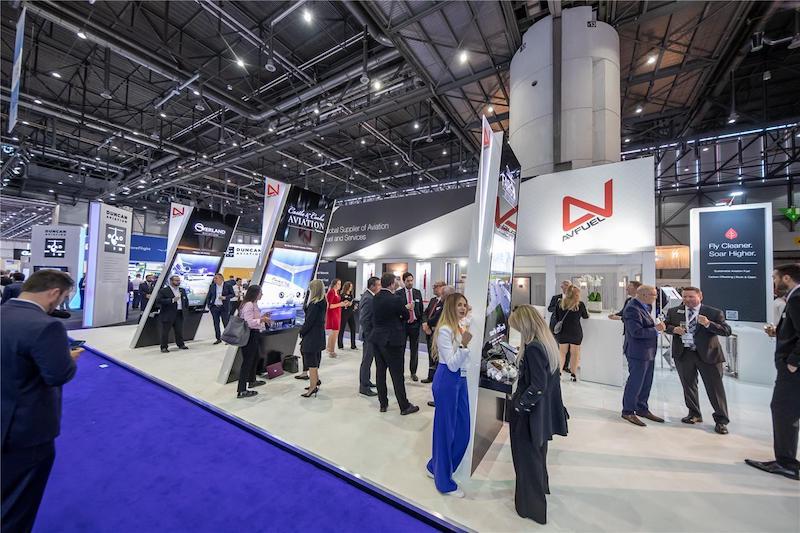Avfuel Keeps Investing In Clean Fuels Amid Growing Business Aviation Interest

GENEVA—U.S.-based fuel supplier Avfuel sees growing demand from the business aviation sector for sustainable aviation fuel (SAF) and is continuing to invest in companies that it believes can help meet that demand.
Avfuel has been investing in the clean fuel technology sector for some time, setting up Avfuel Technology Initiatives Corporation over a decade ago to focus on the sustainability sphere.
“We saw that sustainability issues were something that was going to happen and we’ve put a lot of focus on it over the years, spending millions of dollars in R&D and trying to find solutions,” President and CEO Craig Sincock tells ShowNews at AvFuel's stand, where his son C.R. Sincock II, Avfuel's executive vice president, is also present.
Last year, through its subsidiary, Avfuel invested in a number of new sustainable technology companies, like VerdeGo Aero, which is developing a power solution for hybrid-electric aircraft, and Air Company, which uses carbon capture technology to make clean fuel.
The company is keen to focus efforts across the spectrum of SAF, from biomass-based fuels to e-fuels.
“Right now, we are Neste’s main distribution partner in the U.S.—so that’s our current [hydroprocessed esters and fatty acids, HEFA] SAF strategy. But then going forward we have investments with companies and distribution partnerships and offtakes in each of the generations of SAF, from biomass-based, right the way out to power-to-liquid e-SAF,” C.R. Sincock II says.
“HEFA feedstocks are going to run out, or at least become very limited, by 2030. After that, you’ll have to have contributions from other technologies,” C.R. Sincock II adds.
Avfuel acts as more than just an investor—offering advice on strategy, regulatory environment and markets and, in some cases, assistance in setting up a distribution network, he says. The company has already invested “many multimillions” and that figure is set to grow.
Avfuel is also targeting having SAF available at a “much higher” number of its close to 700 Avfuel-branded fixed-base operations (FBO), where about 18 offer SAF so far.
“In the U.S., we’ve been rolling it out pretty steadily over time—we have about 18 FBOs that have actual SAF on a rateable basis,” Sincock says. In addition, Avfuel delivers SAF to more than 20 corporations. The company also supplies aircraft OEMs—it delivered SAF to Dassault Falcon Jet, Embraer and Textron to fuel their flights to Geneva for EBACE. “We do see it as a way to the future, but it will be difficult to produce as much SAF as everybody would like,” Sincock warns.
SAF accounts for about 6-8 million gal. of total jet fuel demand for business aviation in the U.S., where the total jet fuel demand currently sits at around 1.5 billion gal. Avfuel supplies about half of that quantity of SAF.
“Right now, the vast majority of SAF in the U.S. comes in on the West Coast by ship or from one or two refineries. That really limits the availability of SAF. Either at the end of this year or early next year, we’re expecting additional supply points to come on stream in other geographies, which should then make delivery of SAF much more realistic,” C.R. Sincock II says.
That’s a better ratio than across broader jet fuel demand, where only around 60 million gal. of SAF were used compared to 27 billion gal. of jet fuel overall.
That’s largely because of “voluntary demand,” he said, adding: “[Some] corporations and individuals ... are willing to spend some incremental amount of money because they want to be more environmentally responsible, a decision they are making voluntarily as opposed to waiting for a government mandate.”
Avfuel has also been seeing increased interest in its price risk management product for jet fuel, which allows customers to pay a fixed price for jet fuel regardless of market fluctuations, Sincock says.
“It’s been especially interesting for customers given the volatility lately.”
